
Faculty Mentorship: Professor Andrew Teel
The ECE Current Newsletter (Fall 2019)
"I think of university mentoring as guiding a student through the academic environment to a point where they can contribute and succeed in a field that intrigues and inspires them"
What does mentoring mean to you and why is it important to your profession?
I think of university mentoring as guiding a student through the academic environment to a point where they can contribute and succeed in a field that intrigues and inspires them. For the student, mentoring is important to receive because the opportunities here can seem limitless; it is a daunting task to decide how to make choices about how to invest one’s time. For the profession, mentoring is important to provide because each new generation of researchers and professionals brings a fresh perspective that furthers technology; we want to equip our students to make these contributions without over-constraining them with preconceived ideas about how technology must work.
As a student, did you have faculty that you looked up to?
As an undergraduate student at Dartmouth, I recall being inspired by the energy and rigor of an economics professor who challenged me, as an engineering major, to outperform the economics majors in the mathematically-oriented economics class. Most of the engineering professors at Dartmouth were very applied which, oddly, did not particularly inspire me. They advised me not to go to Berkeley for graduate school because it would be too theoretical. While I valued their input, I am thrilled that I did not follow their advice!
Do you think it’s helpful for students to find a mentor at that level?
I do, especially at a large top-tier research university like UCSB. Cutting-edge research is a hallmark of such institutions, and the university’s professors are a resource, providing a glimpse into research mechanisms and insight into the future directions of technology.
How do you measure your success as a teacher?
The goal should be the same as the mentoring goal: to equip the students to contribute and succeed in a field that inspires and intrigues them. Our measure of success should be whether we are accomplishing this goal.
What aspects of an academic career do you find most rewarding?
For me, the most rewarding aspect of my work is finding new, efficient algorithms that solve engineering problems, proving that the algorithms work as intended, developing new analysis tools that are needed to establish these proofs, and seeing my graduate students eventually do the same. It is also rewarding to inspire undergraduate students to pursue higher education, whether at UCSB or elsewhere.
What do you hope students take away from their time in your lab?
Their time in my lab is an opportunity for them to expand their perspectives, to strengthen their math and writing skills, to develop a keen eye for interesting problems, and to cultivate their passions for particular engineering applications. I give my students a significant amount of freedom in how they experience this growth process. This freedom can be particularly challenging for students who are used to a significant amount of structure, but the payoff can be large for those who are able to find their own footing and thrive.
Do you keep in touch with any of your former students?
Yes, especially the PhD students who have gone on to faculty positions, or other PhD students who attended conferences on the latest developments in the field.
Do you have any advice for ECE students?
Remember that learning doesn’t stop after university ends. You have a unique opportunity to develop specialized skills and knowledge through your ECE education. But, also, in life, do not neglect to develop your breadth. I just finished reading an outstanding new book called Range: Why Generalists Triumph in a Specialized World. It extols the virtues of life-long learning and developing “range” to be better equipped to solve challenging problems. I would encourage students to read this book and take its message to heart.
The ECE Current – "Faculty Mentorship: Professor Andrew Teel" (page 4)